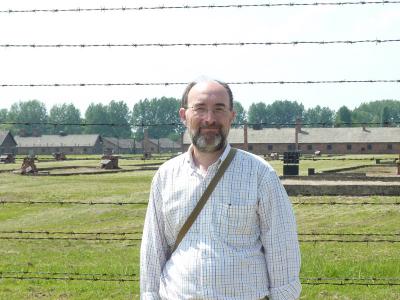The study of the Holocaust warns us about the danger of ideology and that the danger remains present. Dr. Esteban González López reminds us that every aspect of this shadow in the history of humanity must be studied in depth.
Dr. Esteban González López is associated with the Universidad Autonoma de Madrid and works as a family physician and professor. He studied at Yad Vashem in 2009, and subsequently enrolled in additional Holocaust-related courses in Berlin. Dr. González López was personally touched by the testimony of MazalTov Behar Mordoh, who painfully related his experience as a victim of medical experiments in Block 10 of Auschwitz I.
Dr. González López worked closely with Sefarad-Israel to develop a course about Nazi medicine, as well as a network of medical professionals who are interested in promoting awareness about this topic throughout Spain. In his eyes, it is imperative for physicians today to learn about the leading role medicine played in Nazi Germany. After all, pseudo-science and racism were the core of Nazi ideology. Moreover, many German doctors at that time were members of the National Socialist Party. German medical personnel carried out forced sterilizations, medical experiments, and “mercy killings” which the Nazis used to euphemistically refer to their systematic extermination of certain groups including the mentally ill, aged, disabled and others. The Euthanasia Program, code-named T4, was part of the Nazis’ attempt to preserve the purity of the so-called master race – in order to create a superior group of “Aryans” the Nazis made the decision to try and destroy all those with racial defects.
In his lectures, Dr. Esteban González López also focuses on the role that Jewish doctors played in the ghettos. He highlights how despite the insurmountable circumstances, many Jewish physicians maintained their humanity, attempted to save lives and gave affection to the ill. In addition, he places an emphasis on the deeds and dilemmas of Jewish doctors during the Holocaust, as well as about the opening of, an underground medical university in the Warsaw ghetto.
He aims to strengthen bioethics and improve the professional development of the doctors of today in Spain. In his opinion, by studying this history, they will become better doctors. He hopes that medical personnel will, as a result of their studies, become more sensitized to respecting patients' rights, not being influenced by economic or political power, not becoming inhuman, not mistreating corpses, respecting confidentiality, and more.
Dr. González López believes that studying this subject matter has ultimately made him a better doctor, and he hopes to transmit what he has learned to many more health care professionals in the future.







